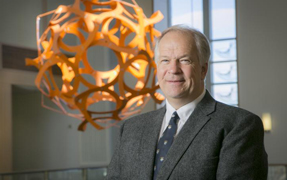Advice for Attending a Science Conference for the First Time

Attending a scientific conference for the first time is a memorable experience. Perhaps you attended with a more senior colleague or advisor who mentored you throughout and helped make introductions. Or maybe you attended with a group of students from your university, and you stuck together as a pack. But many people attend their first conference alone and aren't sure what to expect or what they want out of it.
We asked conference veterans for their tips on Reddit, and here's what they had to say:
1. Talk to people.

Meeting new people ranked number one as the most important tip for attending a scientific conference. Everyone agrees that it's one of the best outcomes from a meeting—more important, even, than attending technical talks, which can often be read as papers after the fact. New connections can lead to job opportunities, collaborations, mentors, and even lifelong friends.
But how to break the ice? You're standing at coffee break, heavy bag over your shoulder, coffee in one hand, cell phone in the other, feeling a bit awkward, and you notice someone else standing alone nearby, looking equally uncomfortable, possibly also looking at a phone. Should you go say hi? Yes, yes you should. And it will be so much easier if you have prepared a short intro about yourself in advance. Also, put away your cell phone so you have a hand free to shake.
Actually, just put away your phone at social events, period. Looking at your phone sends the message "Don't approach. I'm busy."
You may even attend a conference with the hope of meeting someone specific—maybe a rockstar in your field, or the leader of a lab you want to work in. In that case, u/noldig has a good formula for an introduction:

This approach shows that you've done your homework, you're curious, articulate, and confident. All good qualities in future employees and collaborators.
If you're not sure how to approach someone at a networking event—maybe your rockstar is already surrounded by colleagues and admirers at the welcome reception—then attend their talk and catch them in the hall afterwards. The conference halls are a great place to ask questions and start a conversation about someone's work.
2. Make a plan.

Making daily plans can be a challenge for people who prefer to approach life with a laid-back, take-it-as-it-comes attitude. That approach can work really well at a small conference where everyone looks vaguely familiar after three days together, but if you're attending a large conference with more than 10,000 people, it's easy to get lost, metaphorically and literally.
Take 15 minutes every night to make a list of the next day's events that you don't want to miss. Make a separate list of those that would be nice to attend, but could be bumped if something better comes up. Then, take a look at the conference venue map and plan your route. Some conferences, like SPIE Photonics West, take place in multiple conference buildings and hotels that span numerous city blocks, so a little planning can save you the disappointment of missing an event because you couldn't find it.
3. It's OK if you don't understand everything.

Ideas cross-pollinate at big conferences, but that means not everyone is going to be an expert in everything. Don't be embarrassed about this. Take opportunities to talk to presenters one-on-one in the conference halls or at poster sessions. They're usually very happy to explain their work at whatever level you can meet them, from novice to expert.
By asking questions outside of your technical comfort zone, you may learn about an exciting new research direction, or discover a new application for your work.
4. Take notes.

This might seem obvious, but it's worth emphasizing. Just because you circled and put a star next to someone's talk in your program doesn't mean you'll remember why you did that three weeks later. Plus, there's a good chance your program will end up in a recycling bin or left behind in your hotel room.
Whether you're taking notes on your laptop, on pen and paper, on your phone's memo app, or in the conference app itself (the SPIE conference app has a nice notes feature), make sure to record the names of talks and people you want to remember, as well as ideas you'd like to revisit.
At SPIE conferences, many of the papers and presentation recordings are available a few weeks afterwards on the SPIE Digital Library, and if your notes are unclear, you can glean some additional information from hearing the talk again or reading the details of the paper.
5. & 6. Follow up. Snack up.

This Redditor tip includes two important nuggets:
First, post-conference, follow up with the presenters you enjoyed hearing from. Most researchers are delighted to hear from people who are interested in similar topics, and more importantly, you never know if the connection might lead to a future collaboration or employment.
Second, conferences are exhausting, so take advantage of the free food and fuel up on appetizers, cookies, and coffee.
But the cookies. Really.
| Enjoy this article? Get similar news in your inbox |
|



